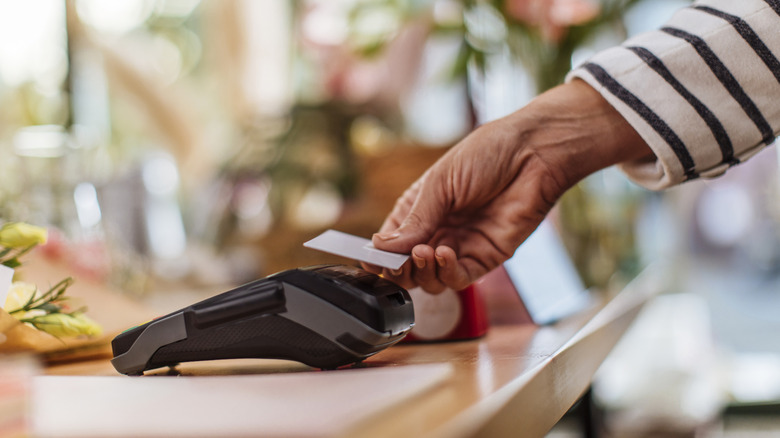Rick Steves' Game-Changing Tips To Avoid Credit Card Fees When Traveling Abroad
If you've ever been overseas, you may have come home to a big surprise in the form of credit card fees you didn't know you were incurring. It can be a rude awakening when you get your bill, and really stressful if your budget is tight. However, you may be able to avoid some of them, or at least budget them in if they're going to happen, with some tips from travel pro Rick Steves. On his website, he outlines the extra fees you may not know you're being charged. These can include an international transaction fee (which can occur with Visa or MasterCard) of less than 1%, a currency conversion fee, which can sometimes be between 1 and 3%, and more. Fortunately, Steves has helpful advice to avoid as many fees as possible.
The first thing Steves recommends is to prepare beforehand. He says, "Before you leave home, call your bank or credit-card company and quiz them about the specific fees that come with using their card overseas." It's also a good idea to simply let your credit card company know you'll be out of the country, in case there is a suspicion of fraud that could lead to your card being shut down. Steves advises asking whether your card can use tap-to-pay, as this is especially common in Europe. If your credit card doesn't have a PIN, you may want to ask for one as well, as it's sometimes required. You should also ask if there are international transaction fees.
Tips for avoiding fees on your cards while traveling, as per Rick Steves
Another tip from Rick Steves: Skip any spot that uses dynamic currency conversion or DCC. On his website, he explains, "Many European merchants and hoteliers — capitalizing on the fact that some Americans are intimidated by unusual currencies — cheerfully charge you for converting your purchase price into dollars." You should also avoid getting totals in U.S. dollarswhenever possible. Always choose local currency if it's offered, as the exchange rate is from the merchant's bank, and there may be a convenience fee for converting to dollars. He suggests circling the local currency total on receipts before paying. If you can't pay in local currency, write "local currency not offered" on the receipt and tell the merchant you'll dispute it with your bank.
If you generally use a debit card for your transactions, there are a different set of fees you have to watch out for. In this case, too, ask for the total in local currency instead of dollars. Steves recommends using bank ATMs rather than independent ATMs like Travelex, Euronet, Cashzone, Your Cash, and Cardpoint. It's easy get scammed at these, and he says your own bank may have partnerships with certain European banks that allow you to avoid transaction fees. Call your bank to ask which ones before your trip. Transaction fees can be up to $5, and that adds up fast.
Another thing to know about money before you take your trip: Exchanging dollars for foreign currency at the airport is a waste of money. Get cash at an ATM instead. Finally, scams happen no matter where you are. Before your trip, take a look at Steves' red flags that signal you might be about to fall victim to an ATM scam.

